Industrial music is a genre of music that draws on harsh, mechanical, transgressive, or provocative sounds and themes. AllMusic defines industrial music as the "most abrasive and aggressive fusion of rock and electronic music" that was "initially a blend of avant-garde electronics experiments and punk provocation." The term was coined in the mid-1970s with the founding of Industrial Records by members of Throbbing Gristle and Monte Cazazza. While the genre name originated with Throbbing Gristle's emergence in the United Kingdom, artists and labels vital to the genre also emerged in the United States and other countries.
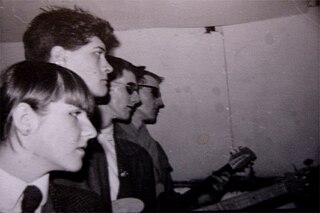
Young Marble Giants were a Welsh post-punk band formed in Cardiff, Wales, in 1978. Their music was based around the vocals of Alison Statton along with the minimalist instrumentation of brothers Philip and Stuart Moxham. Their early sound was a sharp contrast with the more aggressive punk rock that dominated the underground at the time. Young Marble Giants released just one studio album, Colossal Youth, in 1980. They also released two EPs and recorded a John Peel session.

Cabaret Voltaire were an English music group formed in Sheffield in 1973 and initially composed of Stephen Mallinder, Richard H. Kirk, and Chris Watson. Named for the Zürich nightclub that fostered the early Dada movement, the band are often characterized as among the most innovative and influential electronic acts of their era.
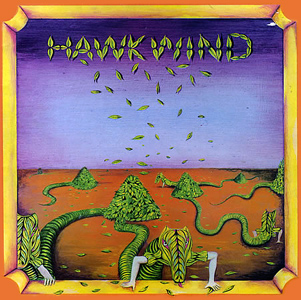
Hawkwind is the debut album by Hawkwind, released in 1970, originally on Liberty Records, later reissued on Sunset Records. This album is historic since it is one of the first space rock LPs.

Clock DVA are a musical group from Sheffield, England, whose style has touched on industrial, post-punk, and EBM. They formed in 1978 by Adi Newton and Steven "Judd" Turner. Along with contemporaries Heaven 17, Clock DVA's name was inspired by the Russian-influenced Nadsat language of Anthony Burgess's novel A Clockwork Orange. Dva is Russian for "two".

Chris & Cosey, sometimes known as Carter Tutti, are a musical duo formed in 1981, consisting of couple Chris Carter (electronics) and Cosey Fanni Tutti, both previously members of industrial music pioneers Throbbing Gristle. Since the release of their 1981 debut album Heartbeat, the group have expanded on the rhythmic ideas of Throbbing Gristle while adding synthesized pop elements to their sound.

Richard Harold Kirk was an English composer, musician and producer. Kirk is best known for his work in electronic music, and for co-founding the influential music group Cabaret Voltaire in 1973. As a solo artist, Kirk released music under his own name as well as under more than 30 aliases. He also collaborated with other artists in a range of groups such as Sweet Exorcist and Acid Horse.

Extended Play is an extended play and the debut release by English industrial band Cabaret Voltaire. It was released in November 1978, through record label Rough Trade.
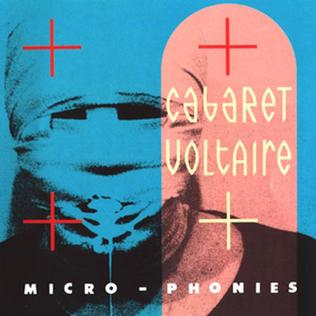
Micro-Phonies is the sixth full-length studio album by British electronic band Cabaret Voltaire. Released 29 October 1984, the album was the group's most mainstream release to date, with the singles "Sensoria" and "James Brown" gaining popularity, especially the former, due to the music video finding MTV airplay. The album sees Cabaret Voltaire continuing to change, pursuing the more electro and synthpop-oriented direction they had started shifting towards on The Crackdown.
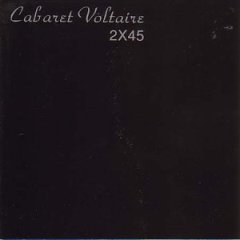
2x45 is the fifth studio album by English band Cabaret Voltaire. It was released in May 1982 through Rough Trade. This was the last studio album by the band to feature founding member Chris Watson, who had departed during its recording.
Daniel Otto Joachim Miller is a British music producer and founder of Mute Records.

Mix-Up is the debut studio album by English band Cabaret Voltaire. It was released on 23 October 1979, through record label Rough Trade.

Live at the Y.M.C.A 27-10-79 is a live album by industrial/post-punk band Cabaret Voltaire, recorded in 1979 and originally released in 1980 by Rough Trade. It was re-released on CD in 1990 on Mute Records in the UK and on Restless Records in the USA. The album contains a cover of The Velvet Underground's "Here She Comes Now" from their album White Light/White Heat.

The Crackdown is the fifth studio album by English electronic band Cabaret Voltaire, released in August 1983 jointly through record labels Some Bizzare and Virgin. It was produced by the band themselves and Flood. Mixing their earlier experimental sound with more conventional dance rhythms, the album received positive reviews and was listed on NME's "Albums of the Year" in 1983.

Red Mecca is the fourth studio album by English industrial band Cabaret Voltaire, released in September 1981 through Rough Trade Records.

A Factory Sample is a 7-inch double sampler EP released in January 1979 by Factory Records of Manchester, England. Funded by a small inheritance which had recently been bequeathed to Tony Wilson, it was the first vinyl recording to be released by the label. The cover of the EP is made of rice paper, dyed silver and sealed inside a thin plastic bag.
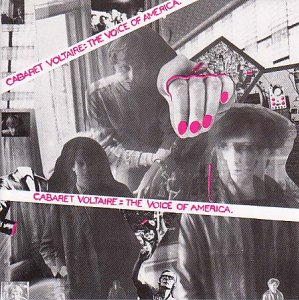
The Voice of America is the third studio album by English band Cabaret Voltaire. It was released in July 1980, through record label Rough Trade.

Hai! is a 1982 live album by the U.K. industrial band Cabaret Voltaire. It was recorded at the Tsubaki House in Tokyo, Japan on 23 March 1982, and was released on CD in 1991 by Mute Records Ltd. The original master tapes being lost, the CD was transferred from a vinyl copy.

The Covenant, The Sword and the Arm of the Lord is the seventh full-length studio album by the electronic band Cabaret Voltaire. The album was released through Some Bizzare Records in November 1985. The album's title was shortened to The Arm of the Lord for the United States.

Groovy, Laidback and Nasty is the ninth studio album by English electronic band Cabaret Voltaire, released in April 1990 by record label Parlophone.


















